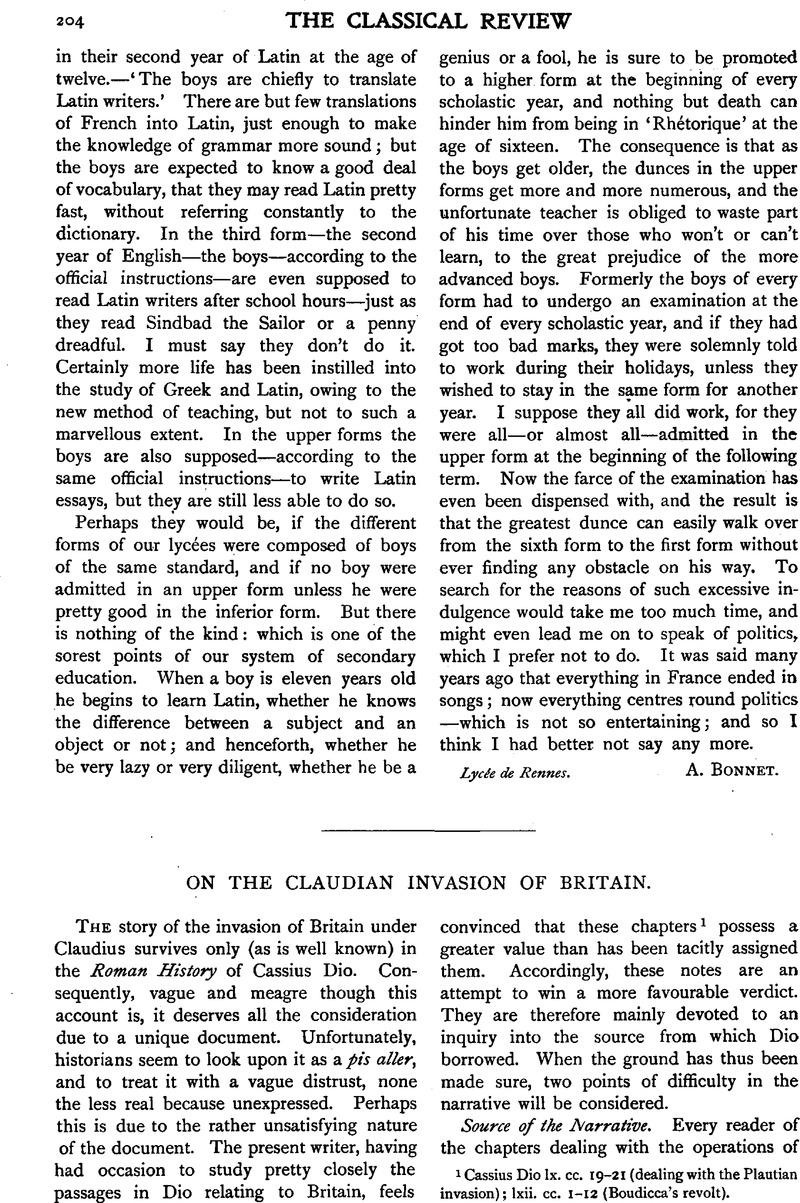Article contents
On the Claudian Invasion of Britain
Published online by Cambridge University Press: 27 October 2009
Abstract

- Type
- Original Contributions
- Information
- Copyright
- Copyright © The Classical Association 1908
References
page 204 note 1 Cassius Dio lx. cc. 19–21 (dealing with the Plautian invasion); lxii. cc. 1–12 (Boudicca's revolt).
page 205 note 1 Cass. Dio lxii. 2.
page 205 note 2 Ib. c 6.
page 205 note 3 Id. c. 7.
page 205 note 4 Tacitus Ann. xiv. 32. 2 (he is obviously borrowing from the same source as Dio).
page 205 note 5 Suetonius viii. 3. 4 (though this may be from an epigraphical source).
page 205 note 6 Cassius Dio Ix. 21 (contrast Suetonius v. 17).
page 205 note 7 1b. ![]() .
.
page 205 note 8 Cf. also lxii. 1.
page 205 note 9 But this can probably be inferred from Suetonius v. 17.
page 206 note 1 Tacitus Annals, vol. ii. pp. 133 sqq. (Mr. B. W. Henderson, in his paper on ‘The Roman legions in Britain,’ has anticipated certain of my arguments: I had not had the pleasure of seeing Mr. Henderson's paper [Eng. Hist. Rev. 1903] when I worked out this question.)
page 207 note 1 See Holmes, Rice, Ancient Britain and the Invasions of Julius Caesar, pp. 334–335.Google Scholar
page 207 note 2 lx. 21.
page 207 note 3 C.I.L. vii. 11. Hübner (loc. cit.) inclines to regard the Cogidubnus of the Goodwood inscription as the son of the client-prince of Tacitus, relying apparently on the Flavian date of the monument. This seems unnecessary. (1) Cogidubnus seems to have lived on into Flavian times: Tacitus says ‘is fidelissimus ad nostrum memoriam remansit’; i.e. he probably lived on into Agricola's governorship. (2) Why bestow extraordinary titles on the son when the need for conciliation was far less than before? (3) The names ‘ Tiberius Claudius’ surely point back to the Claudian period.
page 207 note 4 Agricola c. 14.
page 208 note 1 Colchester itself seems to have been stormed (Cassius Dio lx. 21 and Suet. v. 21). Some writers place several battles between the crossing of Thames and the taking of Colchester; but Dio (loc. cit.) distinctly puts the salutations as Imperator after the capture of the city.
page 208 note 2 Tac. Ann. xiv. 33. 1–4.
page 208 note 3 Furneaux vol. ii. p. 145, note 2.
- 1
- Cited by


